- JKAAC requires immediate restoration of internet services.
- The Minister of Law warns against hasty constitutional changes.
- Govt calls to find solutions through peaceful dialogue.
Formal conversations between Jammu Kashmir Awami Action Committee (JKAAC) and a government -named negotiating team have resumed in Muzaffarabad.
The second round of negotiations opened between a delegation sent on the directives of Prime Minister Shehbaz Sharif and representatives of the public action committee shortly after Friday prayers.
The Action Committee has organized protests in Azad Jammu and Kashmir (AJK), who became violent and claimed the lives of at least nine people, three of them were police personnel and wounded over 100.
The region witnesses an overwhelming shutdown and Wheeljam strike in the midst of intermittent skirmishes between law enforcers and activists in the state capital, Muzaffarabad.
JKAAC had issued a 38-point charter of requirements, including ending 12 reserved seats for refugees and rolling back “Privileges of the elite”, according to the elite “, The news.
Participants from the government side included federal ministers Tariq Fazal Chaudhry, Amir Muqam and Ahsan Iqbal, while Raja Perez Ashraf, Qamar Zaman Kaira, Rana Sanaullah and others were also present.
Core members of the Action Committee, including Sardar Masood Khan and Sardar Yousaf, participated in the discussions.
Members of the Action Committee demanded restoration of Internet services, and officials said the final consultations on the remaining requirements will take place during the negotiations.
The federal minister of parliamentary affairs Chaudhry said they fully support Kashmiri’s people’s rights and noted that most demands that are considered to be in the public interest have already been accepted.
He added that a few outstanding requests require constitutional changes and are therefore subject to further discussion.
Chaudhry emphasized that violence is not a solution and expressed hope that the action committee will solve unique problems through peaceful dialogue.
Law Minister Azam Nazeer Tarrar dealt with legal and constitutional considerations associated with the negotiations.
He pointed out that the voters in the 12 constituencies assigned to AJK originate from Kashmir, that their affiliation with Kashmir holds despite displacement and that any change should not suddenly interrupt these tapes.
He emphasized the need for a comprehensive constitutional package and a broad political consensus with the inclusion of all Kashmir management.
Tarrar warned against hasty decisions on constitutional changes and fundamental rights and noticed several legal complexities and potential social and political consequences.
He noted that there is no provision for a referendum in the Kashmir Constitution and claimed that rushing measures could hurt the Kashmir case.



